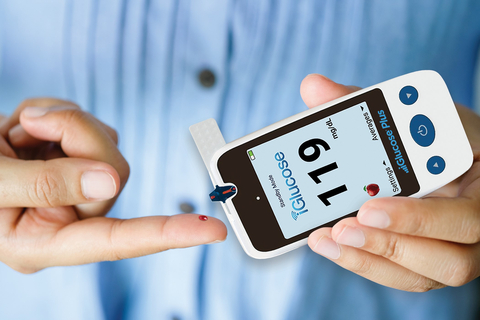The results of the 2024 National Diabetes Care Survey, a longitudinal analysis of patients with Type 2 diabetes in the United States, have been released and provide important insights into how remote patient monitoring (RPM) can benefit patients with chronic conditions. The survey results show that the use of Cellular RPM™ devices, which increased a staggering 57.6% year-over-year, are easier for patients to use than Bluetooth®-enabled devices.
This press release features multimedia. View the full release here: https://www.businesswire.com/news/home/20241107516489/en/

The cellular-enabled iGlucose Plus is easy for people with diabetes to use and the reading is sent immediately via a secure cell signal to a healthcare professional. (Photo: Business Wire)
In fact, 76% of participants who use a Bluetooth device indicated they sometimes, often, or always have issues sending their readings to their provider, and an overwhelming majority (70%) of that group said they always have issues. For the third year in a row, the number of people who have issues with Bluetooth increased. For the same question in the 2023 National Diabetes Care Survey, 70% of those surveyed responded they have issues. And in the 2022 survey, 60% had issues sending their reading with Bluetooth glucose monitors.
So, while there was a dramatic increase in respondents indicating they use cellular-enabled glucose monitor in the last two surveys and have few or no issues with its use, there was also an increase in the number of people who have issues with Bluetooth-enabled devices that require pairing, synching, and Wi-Fi in order for the reading to be transmitted to a healthcare professional. These kinds of issues can cause patient frustration, leading to non-adherence to testing protocols. More and more people are using connected glucose meters to ensure their doctors have their readings to help better manage their health, and the survey data clearly shows that cellular-enabled devices are significantly more reliable than Bluetooth-enabled devices.
November is American Diabetes Month®, a time to raise awareness for a disease that has already affected more than 38 million people in the United States, and another almost 98 million with prediabetes. In the last 20 years, the number of Americans with diagnosed diabetes has more than doubled. According to one study, about 45% of people with diabetes don’t adequately control their glucose levels.1 Testing their glucose and knowing their reading on a regular basis can help people with Type 2 diabetes better manage their disease. It is also imperative for their physician to know their daily glucose reading to provide guidance and possible adjustments to their care plan.
With most people with Type 2 diabetes only seeing their doctor two times a year or less, they are asked to keep track of their testing numbers for long periods of time. If a patient is solely responsible for writing down their readings for review by their physician during an office visit, there may be an issue with those readings. It is estimated that 50% of patients don’t adequately track readings or provide false readings to their doctor.2
“While Bluetooth-connected devices for monitoring people with diabetes are common, they are not always the most effective,” said Dr. Bill Lewis, a member of the CHQI Telemedicine Standards and Medical Advisory Board and Chair of the Telemedicine Accreditation Committee. “Connection issues with Bluetooth devices are a common problem and patients become less likely to utilize the technology. A device that utilizes an automatic cellular transmission of data resolves so many of these problems.”
Patients and providers are looking for an easy-to-use glucometer so glucose readings can be taken at home and transmitted to a healthcare professional. With cellular remote glucose monitoring solutions from Smart Meter, providers are assured of getting the latest and most accurate data when a patient tests. This can help identify trends, prevent hospitalization, and improve outcomes between office visits.
Cellular-enabled monitors are some of the easiest for patients to use to test their glucose levels regularly at home. The convenience of cellular-based glucose monitors enables better patient adherence to care plan instructions, leading to stabilized or better control of diabetes.
“When patients use a cellular-enabled glucose meter, they know their results are being sent immediately to their provider,” Lewis said. “Smart Meter’s iGlucose Plus transmits instantly through an exclusive AT&T private data network so data is secure, accurate, and reliable every time.”
You can view the complete results of the 2024 National Diabetes Care Survey here.
About Smart Meter, LLC
Smart Meter is the trusted supplier of Remote Patient Monitoring (“RPM”) solutions. We empower a nationwide network of SmartPartnersTM who are working directly with healthcare providers to transform patient care. Millions of vital health data readings are reliably delivered across our platform to enable real-time, better-informed health care. Our proprietary patient-friendly cellular FDA-registered monitoring devices are connected to an exclusive AT&T 4/5G network to ensure an engaging patient experience for improved adherence. For more information, visit SmartMeterRPM.com
1Poor medication adherence in type 2 diabetes: recognizing the scope of the problem and its key contributors – PMC (nih.gov)
2 Doctors Want To See Your Glucose Meter | Prevention
View source version on businesswire.com: https://www.businesswire.com/news/home/20241107516489/en/